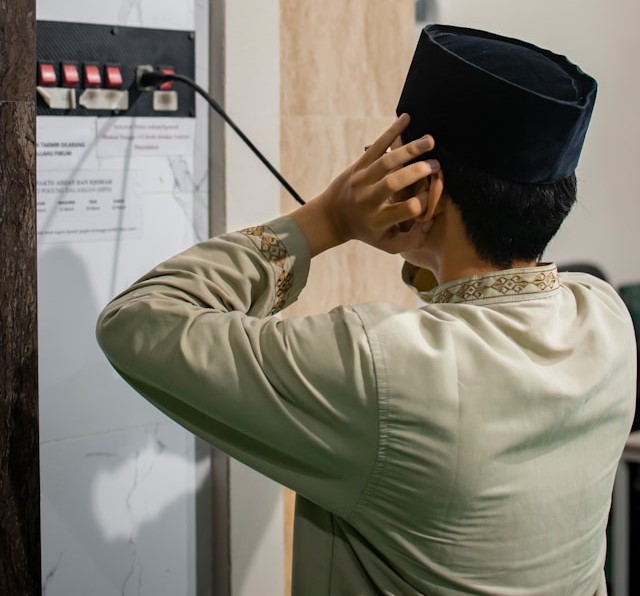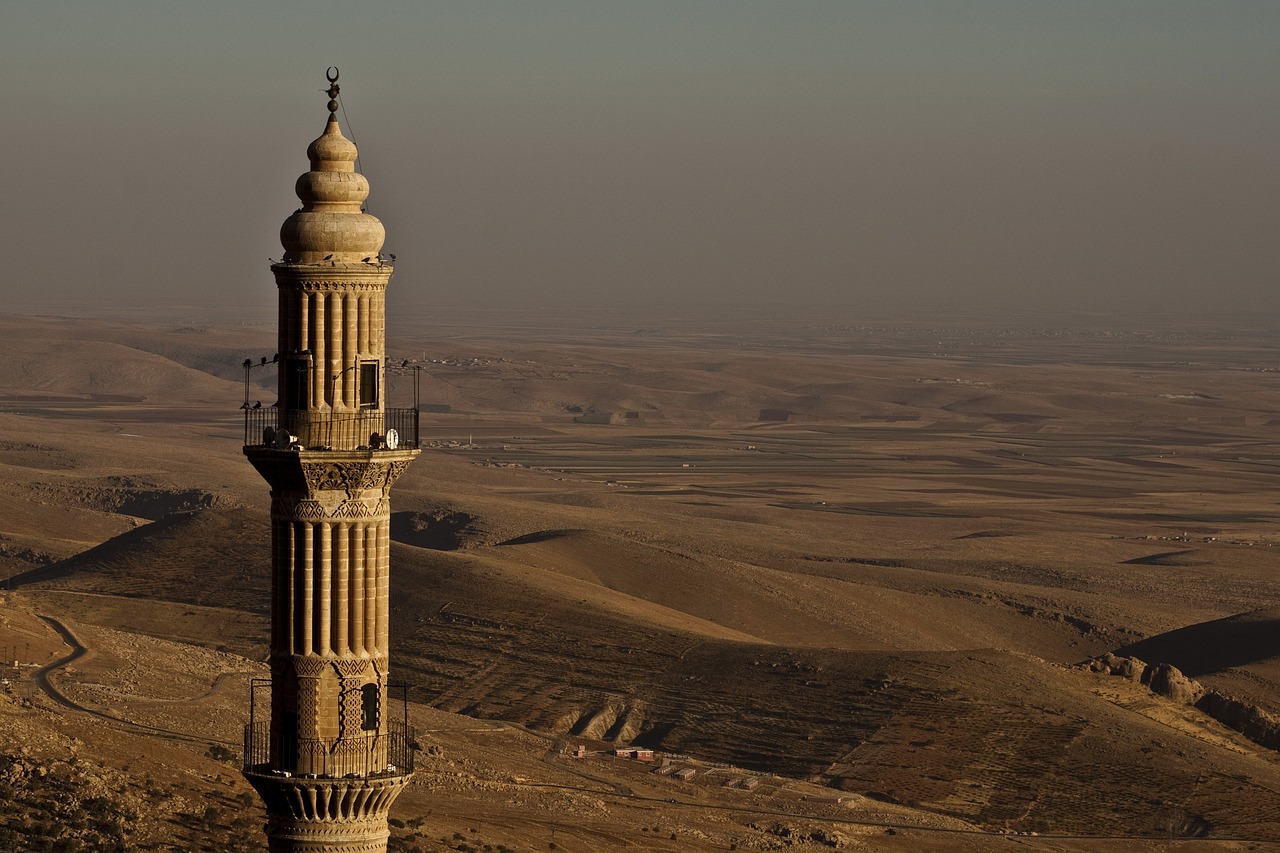
In the Name of Allah—the Most Compassionate, Most Merciful.
The call to prayer, known as the adhan, is heard five times a day in Muslim communities all around the world. It serves as a powerful reminder to set aside worldly goals and direct our attention to Allah SWT.
Not only does the adhan serve as a call to congregational prayer, but the time immediately after it is very important for making dua or supplication.
The Prophet Muhammad (PBUH) underlined the virtues of saying certain dua after azan. The supplications during these periods provide a profound means of connecting with Allah (SWT).
We’ll examine the meaning of dua after adhan, as well as the suggested prayers and their spiritual advantages.
What is the Adhan?

The Islamic call to prayer is the azaan is usually chanted by a muezzin from the tower of a mosque, and it indicates the times of the five required daily prayers (salah). This beautiful appeal is made up of certain Arabic words that praise Allah SWT, declare the Islamic faith, and encourage prayer from the faithful.
Hadith in Bukhari 578 narrates:
Apart from its use as a call to prayers, the adhan has a deep spiritual significance. The sound of it reverberates throughout villages and cities, fostering a sense of solidarity among Muslims. People listen to the azaan as a regular reminder to put their relationship with Allah SWT first despite all of life’s distractions.
Importance of the Adhan
The azaan indicates the hours for prayers that are mandatory in the Quran. It is extremely significant in Islam as a call to prayer, a representation of faith in Allah (SWT). The adhan’s virtues were highlighted by the Prophet Muhammad (PBUH) in a number of hadiths, which are collections of accounts of his sayings and deeds.
One Hadith states,
This emphasizes the adhan’s function in calling Muslims to perform their required prayers (salat). The azan acts as a potent daily reminder to offer salah for Allah SWT.
The beautiful recital of the Islamic creed functions as a proclamation of religion in public, fortifying the resolve of adherents and possibly easing the resistance of non-believers against the words of Quran.
So, what to say after the Adhan goes off?
Dua after Adhan in English
Prophet Muhammad (PBUH) mentioned a specific dua after azan mentioned in al-Bukhari, 588 as follows:
Dua after Adhan in Arabic
At what times are dua accepted?
Islam emphasizes specific times where duas (supplications) are considered especially likely to be accepted by Allah (SWT). These moments provide opportunities to deepen our connection with the divine and seek His protection, blessings, and guidance.
Other times believed to hold special significance for dua include during the last third of the night, during rainfall, while prostrating in prayer (sujood), and on Fridays.
Is dua accepted between Adhan and iqamah?
One of the special times when the dua is more likely to be accepted is following the adhan.
The Prophet Muhammad (PBUH) stated,
The above hadith highlights the exceptional potential for dua acceptance within this window. Remember, Allah (SWT) hears our sincere supplications regardless of the time or place. Let’s strive to make dua with proper tajweed a constant companion in our lives.
Etiquette on listening to the Adhan

Observing proper etiquette demonstrates our respect for the adhan and maximizes the spiritual virtues associated with it. The most significant element is to stop whatever you’re doing and listen attentively to the words of the muezzin.
This means pausing conversations, turning off distractions, and fully immersing yourself in the sacred moment.
Additionally, it is recommended to recite along quietly with the muezzin and repeat the words and phrases of the azan. This active participation deepens our connection with the call to prayer and serves as an affirmation of our faith.
When the adhan echoes through the streets, it’s easy to become habituated and let it fade into the background. However, Muslims are encouraged to remain mindful when listening to the adhan, allowing its profound message to penetrate their hearts.
Consciously choosing to pause and give our full attention reinforces the adhan’s significance in our lives and strengthens our bond with Allah SWT.
The adhan serves as a beautiful and recurring reminder to turn towards Allah SWT throughout our busy days. Understanding the proper etiquette and making a conscious effort to know adhan with translation is an act of spiritual experience.
Embracing these acts of reverence and supplication allows us to reap countless blessings and strengthens our commitment to our faith.
Etiquette based on Hadiths
Alongside the general etiquette of attentively listening to the adhan, several hadiths offer more specific guidance on how to best honor this sacred call to prayer. There is a specific section on Shaih Bukhari that is dedicated to adhaan. Here are some hadiths related to the call to prayers.
A hadith in Bukhari 584 states: “Anas bin Malik said,
In Bukhari 587, it is stated:
Reply to the Adhan by Repeating after the Muezzin
Additionally, it’s recommended to recite along quietly with the muezzin, repeating the words and phrases of the adhan.
One hadith states,
The above hadiths encourage us to quietly repeat the words of the adhan along with the muezzin.
Responding to the adhan demonstrates respect for the call to namaz and amplifies its spiritual significance.
Considerations for Listening to the Adhan
Beyond the fundamental etiquette mentioned earlier, the Prophet Muhammad (PBUH) provided additional guidance to maximize the spiritual benefits of reciting dua after adhan.
Prophet Muhammad (PBUH) emphasized the importance of responding to the call to namaz with attentiveness and sincerity, urging believers or salafis to pause their activities and focus solely on the adhan when it is heard.
How to recite the Adhan
The adhan, with its beautiful and evocative phrases, serves as a powerful call to namaz. Muslims who wish to learn or practice reciting the adhan can follow a specific structure. Here, we’ll outline the steps involved and provide resources for further exploration.
The adhan consists of several parts, each recited with specific wording and repetition. The muezzin typically begins by raising their index finger towards their ear and saying the takbir (Allahu Akbar) four times. This is followed by the Ashhadu an la ilaha illa Allah and Ashadu anna Muhammadan Rasool Allah two times each.
The muezzin then says Hayya ‘ala-s-Salah and Hayya ‘ala-l-Falah two times each. Afterwards, the muezzin says Allahu Akbar two times and ends the adhan with La ilaha illa Allah.
Here are the exact words in English transliteration said by the muezzin during adhan.
English Transliteration
Allahu Akbar! Allahu Akbar! Allahu Akbar! Allahu Akbar!
Ashhadu an la ilaha illa Allah.
Ashhadu an la ilaha illa Allah.
Ashadu anna Muhammadan Rasool Allah.
Ashadu anna Muhammadan Rasool Allah.
Hayya ‘ala-s-Salah.
Hayya ‘ala-s-Salah.
Hayya ‘ala-l-Falah.
Hayya ‘ala-l-Falah.
Allahu Akbar! Allahu Akbar!
La ilaha illa Allah.
English Translation
God is Great! God is Great! God is Great! God is Great!
I bear witness that there is no god except the One God.
I bear witness that there is no god except the One God.
I bear witness that Muhammad is the messenger of God.
I bear witness that Muhammad is the messenger of God.
Hurry to the prayer. Hurry to the prayer.
Hurry to salvation. Hurry to salvation.
God is Great! God is Great!
How to recite the Fajr Adhan
The dua after azan of fajar (dusk) is the same as above with the addition of the following two phrases after saying Hayya ‘ala-l-Falah two times.
English Transliteration
As-salatu Khayrun Minan-nawm.
As-salatu Khayrun Minan-nawm.
English Translation
“Prayer is better than sleep.
Prayer is better than sleep.”
Here is what is would look like:
Allahu Akbar! Allahu Akbar! Allahu Akbar! Allahu Akbar!
Ashhadu an la ilaha illa Allah.
Ashhadu an la ilaha illa Allah.
Ashadu anna Muhammadan Rasool Allah.
Ashadu anna Muhammadan Rasool Allah.
Hayya ‘ala-s-Salah.
Hayya ‘ala-s-Salah.
Hayya ‘ala-l-Falah.
Hayya ‘ala-l-Falah.
As-salatu Khayrun Minan-nawm.
As-salatu Khayrun Minan-nawm.
Allahu Akbar! Allahu Akbar!
La ilaha illa Allah.
Other duas
While the adhan itself signifies a prime time for supplication, you can also offer a dua after azan. These supplications hold particular significance and blessings, allowing us to deepen our connection with Allah SWT.
Dua before starting Wudu
Allahuma ij’alni Mina attawabeen wa ij’alni mina al-mutatahiren.
English Translation
Dua after Wudu
After performing wudu (ritual ablution), it’s traditionally recommended to recite a specific supplication.
English Translation
Azan Dua when observing fast
Muslims who are observing a fast should make this dua upon hearing adhan of fajar prayer:
Wa bisawmi ghadinn nawaiytu min shahri {adhkur asm alshahr}.
Translation:
I intend to keep the fast in the month of {mention name of Islamic month}.
Dua after breaking fast
Upon breaking one’s fast at dawn, a dedicated dua provides an opportunity to seek acceptance from Allah SWT.
English translation
This supplication acknowledges Allah’s sustenance, seeks protection, forgiveness, and reaffirms belief in the Islamic faith. Reciting these duas adds a layer of spirituality and enhances the blessings associated with these acts of worship.
Summary – Dua after Adhan
The period immediately following the azaan offers a precious window for making dua (supplication). The Prophet Muhammad (PBUH) emphasized the significance of reciting specific duas at this time, highlighting the potential for acceptance of sincere prayers.
Muslims are encouraged to utilize this opportunity to address their needs, hopes, and worries with Allah (SWT).
After the adhan concludes, reciting a specific dua is recommended. This supplication praises Allah (SWT), sends blessings upon the Prophet Muhammad (PBUH), seeks his intercession on the Day of Judgement, and asks for a special place in Paradise.
Reciting this meaningful dua after the adhan is a beautiful way to deepen our connection with the divine and honour the Prophet Muhammad (PBUH).
Check out our related articles






